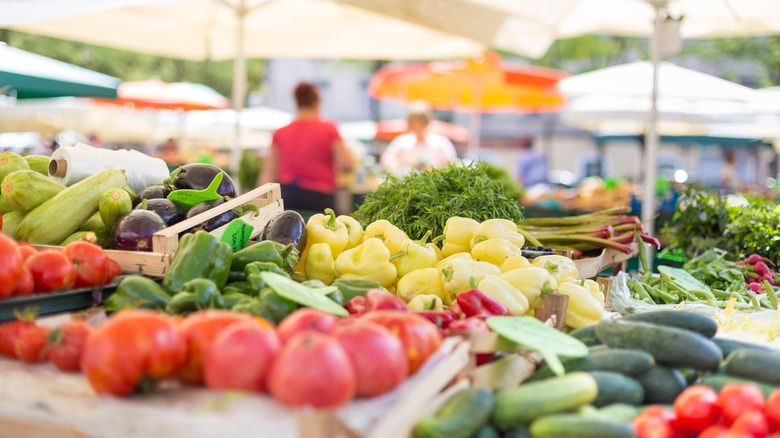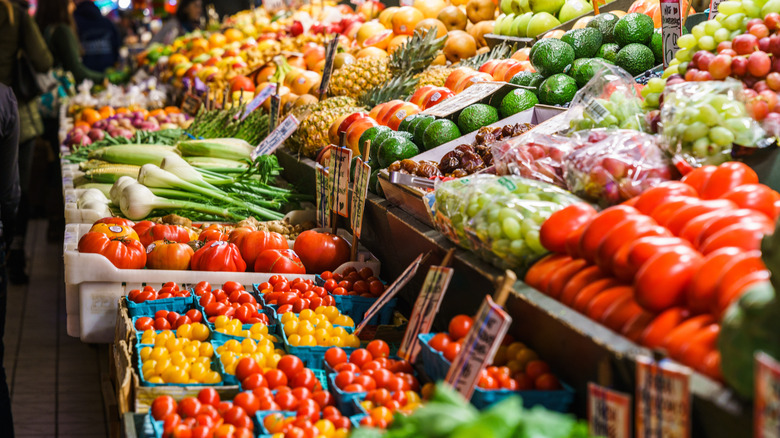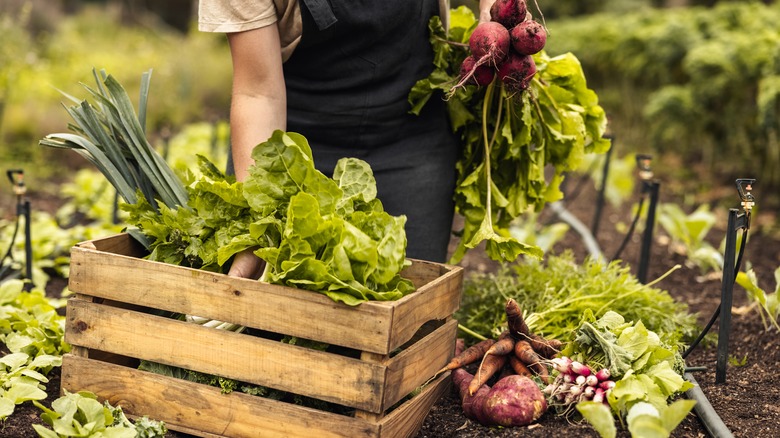Here's Why It Pays To Shop At A Farmer's Market At The End Of The Day
Sometimes grocery shopping can feel like a chore and it doesn't help that grocery prices continue to rise. In fact, the cost of eating at home has increased nearly 12% since December 2021, according to the U.S. Bureau of Labor Statistics. While you're trying to budget your next trip to the supermarket, there may be a place you are overlooking — the farmer's market.
People have been shopping at farmer's markets for ages. Even some past U.S. presidents have frequented a neighborhood farmer's market. For example, Thomas Jefferson would buy beef, eggs, and vegetables at a market in Washington, D.C.'s Georgetown (via Smithsonian Magazine).
One of America's earliest farmer's markets opened in 1730 in Lancaster, Pennsylvania (via the U.S. Department of Agriculture). Since then, farmer's markets have popped up all over the country. There are more than 8,000 farmer's markets throughout the United States, according to a separate USDA article. If you haven't stopped by your local farmer's market, you might want to go on your next grocery run — it could save you a few bucks.
The later you go, the greater the discount
Farmer's markets have developed a reputation for being expensive and exclusive (via Food52). However, there are studies debunking such claims. According to Eat Smart, Move More, fruits and vegetables, such as apples, potatoes, leafy greens, and tomatoes, at farmer's markets often are priced the same as at grocery stores. If you're looking to buy organic produce, the farmer's market may be a more low-cost option than a supermarket. A study found that organic products at farmer's markets are up to 40% cheaper than at grocery stores (via The Atlantic).
While going to a farmer's market will save you some money, going later in the day can give you a bigger bang for your buck. According to Insider, waiting to head to the farmer's market closer to closing time can save you up to 80%. Vendors typically mark down their prices in order to sell their supply of produce. Not only are you getting a good deal, but you're also supporting local farmers and businesses.
Other reasons to shop at a farmer's market
Farmer's markets aren't just a wallet-friendly alternative to your neighborhood supermarket. They also boast several benefits for your brain and body. If you want the freshest and ripest produce, the farmer's market is the best place to find them. Produce sold at farmer's markets is usually picked during the peak of the growing season, according to the USDA. Ripe fruits typically have high nutritional values, such as high antioxidant and vitamin content (via Well+Good). Bell peppers and tomatoes, in particular, have high vitamin C content when they are ripe.
In addition, seasonal fruits and veggies are more readily available at farmer's markets. According to Nature's Path Organic Foods, seasonal produce contains many nutritional benefits. Summer berries are full of antioxidants and winter potatoes and butternut squash are "chock full of nutrients" compared to off-season fruits and veggies. They're also more affordable. Katelyn Nolan Shannon, culinary research and development chef at Sweetgreen, told REAL SIMPLE that seasonal produce will "be a better deal (and more delicious) than harder-to-grow items or out-of-season fruits and vegetables."
The next time you're out grocery shopping, you might want to swing by your local farmer's market. It's an affordable way to get nutritious, seasonal produce and you'll be supporting local businesses — a win-win for everyone.


